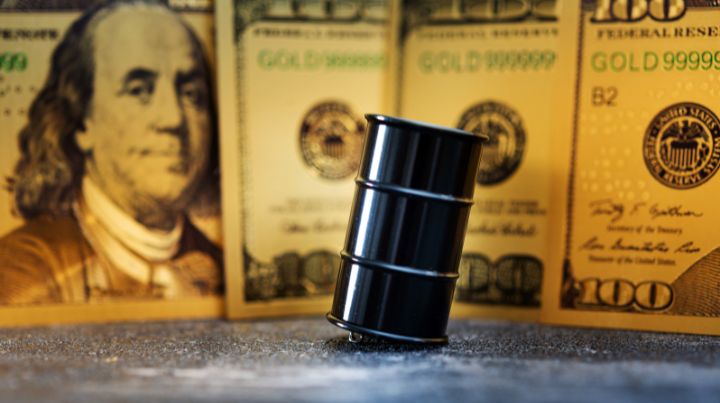Why Are Oil Prices Going Up? Prepping for Higher Fuel Prices ⛽️

Starting in July, Saudi Arabia will cut its oil supply by 1 million barrels per day. This move to bolster the falling oil prices of crude oil for the Organization of Petroleum-Exporting Countries (OPEC) may result in an increase in prices consumers pay at the pump and for other goods and services impacted by this inflationary move.
The slump in crude oil prices that the Saudis are seeking to reverse has allowed U.S. drivers to fill their tanks more cheaply and provided some relief from inflation. Unfortunately for us as consumers in a nation that avoids energy independence, the Saudi decision to cut production will increase global oil demand and may lead to higher oil prices and inflation.
Inflation
For a nation and people already struggling due to inflation, higher gas prices will significantly impact people's wallets. This is because, as you already know, fuel is a significant and unavoidable expense for many households and businesses. Unfortunately, an increase in its price will lead to an overall increase in the cost of living and operating a business.
Here's how the actions of Saudi Arabia may impact the global economy:
1. Direct Impact on Consumers
When gas prices rise, consumers like us have to spend more to fill up their cars. This leaves less disposable income for other goods and services, which can slow down consumer spending—a major component of economic growth. Higher gas prices mean more costly trips to the grocery store, work, or to visit with friends and family. Increased oil prices mean higher heating costs. Likewise, higher gasoline prices mean less money to spend on other things, including our necessities such as food, clothing, etc.
2. Increased Cost of Goods and Services
Gasoline is not just used for personal transportation. It's also a key input in most industries, including manufacturing, agriculture, and transportation. When gas prices rise due to production cuts, the cost of producing and transporting goods increases. These increased costs are typically not borne by the companies providing the goods and services but instead passed on to consumers in the form of higher prices, which contributes to inflation. Therefore, we can expect food prices, home supplies, etc., to increase in cost—further emptying our already struggling bank accounts and wallets.
3. Expectations of Future Inflation
If consumers and businesses expect that high gas prices will continue, they will anticipate higher inflation. As a result, and as we have seen, workers will demand higher wages to keep up with inflationary price increases. That effort to keep pace with inflation can prompt businesses to raise prices in anticipation of their higher costs. In the end, those processes are passed back to us as consumers, starting the inflationary cycle all over again.
How to Prepare for Higher Fuel Prices
As preparedness-minded people, we understand the importance of planning and preparing for various scenarios, including financial downturns, banking crises, and economic upheaval. The prospect of higher fuel prices is no different.
With that, here are some strategies we can adopt to mitigate the impact of rising fuel costs:
1. Use Fuel Efficient Driving Habits
One of the most effective ways to combat rising fuel prices is to improve our fuel efficiency. This could mean maintaining your vehicle to ensure it runs well, adopting fuel-saving driving habits like avoiding rapid acceleration and speeding, or even considering the purchase of a more fuel-efficient vehicle if it's within your means.
2. Be Strategic in Your Travels
Consider becoming more strategic about when you drive and avoiding unnecessary driving when possible. For example, rather than making multiple trips to the store, plan your time to take care of as many things as possible in one trip. Other options include carpooling with friends and biking or walking whenever possible. These alternatives can save on gas and reduce wear and tear on your vehicle.
Read this article on: How to Plan a Road Trip
3. Bulk Purchases and Storage
When prices are relatively low, consider purchasing fuel in bulk and safely storing it. I've done this by adding a transfer tank to the bed of my diesel truck. However, remember to follow all safety guidelines when storing fuel. Likewise, be sure to rotate your fuel supply to keep it fresh. Likewise, when I relied on a gas engine, I stored several fuel cans with STA-BIL in my flammable storage locker.
Here's the article that explains: Why I Installed an L-Shaped Transfer Tank in My Truck
4. Budgeting and Cost Planning
We all know this option. While it may not be fun or easy, working to adjust your budget to account for potential increases in fuel costs can be effective. This might mean cutting back on non-essential expenses or finding ways to increase your income to maintain your financial stability.
5. Invest in Renewable Energy
Consider going off-grid as much as possible by investing in renewable energy sources for your home. Solar panels, for instance, can provide a sustainable energy source and reduce dependence on traditional energy sources. And, as we all know, providing your own power options is an excellent way to avoid being dependent upon a crumbling and increasingly unpredictable power grid.
6. Grow Your Food
Higher fuel prices can lead to increased food expenses due to higher transportation and production costs. By growing your own food, you can help reduce your dependence on grocery stores while shielding yourself from price increases. Likewise, growing your own food allows you to eat cleaner, non-GOM, chemical-laden food products, which not only helps improve your overall health but can also reduce your healthcare costs. If you don't have a green thumb or are in a situation where you can't grow your food, consider keeping your food costs low by joining a farm share.
This is an excellent article about CSA Farmshares.
7. Community Cooperation
Seek out and find like-minded people to work with and develop shared strategies for dealing with higher fuel prices. This could involve shared transportation, bulk buying of supplies, or sharing labor and other resources. You may have a green thumb and know someone good at home repairs. Work out a barter system to help one another avoid the higher costs.
Here's an M4S article on barter skills you can use during tough economic times.
8. Stay Informed
Finally, watch the news and market trends. Being aware of potential price increases or savings before they happen can give you a valuable head start on making necessary adjustments to your lifestyle and budget.

The Bottom Line on Increasing Gas Prices
As preppers, our goal is not just to survive, but to thrive, no matter what challenges we face. Because we can't force our nation into becoming energy independent, which would ensure lower fuel prices, we're forced to cope with the cards we're dealt. With that, by being prepared, planning ahead, and making intelligent, informed decisions, we can do our best to mitigate the impact of rising fuel prices and ensure we're ready for whatever comes our way.
What are your thoughts about our increasing fuel prices? Do you have any tips to help others cope with the increasing cost of fuel? Tell us in the comments below.
Additional Resources:
- East Bay Times Article
- 10 Best Thrift Store Finds for Living a Self-Reliant Life (2023)
- Compounding Problems of the Recession
- Natural Gas Bans: Coming to a City Near You
Stay safe,

Related Articles
FREE Guide
Read the Best Seller
Join Mind4Survival
Stay informed by joining the Mind4Survival! 100% Secure! 0% Spam!
Affiliate Disclosure...
Mind4Survival is a free, reader-supported information resource. If you make a purchase through our link, we may, at no cost to you, receive an affiliate commission.
Do You Want To Be Ready No Matter What?

Download our free 39-page guide with interactive, 7-Day Emergency Kit Checklist and take the first step toward real preparedness.
- Know exactly where to start.
- Save time and money.
- How-to build a complete Basic Emergency Kit.
- Level up your safety and security.
Join Mind4Survival
Stay informed by joining the Mind4Survival! 100% Secure! 0% Spam!







Oil prices are not going up. Around $70 dollars a barrel where they’ve been for a quite some time. I’m sure some day they will go up, but then they’ll come down again. That’s it’s history. I remember so many predicting $150 to $200 dollars a barrel when the Ukraine war started. Never happened Never got close.
I think I’m going to resurrect my bike 🙂